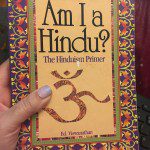The well respected Himalayan Academy and their guru Subramuniyaswami put out a book several years ago called How To Become a Hindu. Over the next few weeks I’ll be reading the chapters and discussing each one individually. Today we’re looking at the third chapter: Gurudeva Speaks on Entering Hinduism.
By the way, I hope that these discussions don’t come across too negative. I do have a great deal of respect for Subramuniyaswami and his organization. I just like to examine things with a bit of a critical eye to make sure I’m not following something with blind faith. A natural effect of when I was young having placed my faith in someone who turned out to be untrustworthy. I just like to examine things.

This chapter is a series of questions and answers by Subramuniyaswami. Most of the questions about entering Hinduism and the importance of severance of former connections, again.
He starts with pointing out that there are two ways one enters Hinduism. One by being born Hindu and one by adopting it. “History tells us that adoptives often become the strongest members of a religion due to their careful study prior to formal entrance and to their deep, soul-stirring convictions.”
I don’t know about strongest, but indeed, the converts have a reputation for intense devotion to their chosen religion. After all, we did have to fight to get where we are and to find the path of our soul. When you go through the trouble of converting to a religion, you’ve done a lot of thinking and considering and caring about religious issues.
Subramuniyaswami emphasizes again that new Hindus must adopt all of Hinduism fully without trying to “pass” within western society. “…devotees willingly wear the marks upon their forehead, decorate their home with the forms of our faith, go to our Gods for their needs, and naturally hold their hands and their heads in a certain way…he must immerse himself in its traditions and lifestyle…he must practice Hinduism only and thus prove his declaration in his own life and in the minds of others.”
This is in conflict with other messages one might hear. There are certainly different ideas about how much culture and lifestyle is appropriate for a western “adoptive” of Hinduism. This particular guru is insistent that one must go the whole way or else it shows that one has a lack of commitment. I’m not entirely sold on that philosophy, though I see his point.
The next question raises a really interesting idea. Subramuniyaswami claims that in ancient times people lived in small, insulated communities and that their souls were reincarnated within their group (I don’t know how he knows that, but it does make some sense). Now in modern times people are moving and traveling and there is more global awareness. He says this leads to “this tightly knit pattern of reincarnation [being] dispersed.” Souls might be born now into new cultures and communities unlike anything they had experienced before. “There are different religions to accommodate different peoples at different places on the Eternal path.”
Often he speaks about respecting other religions and religious leaders, ethical conversion, and allowing people to find themselves in the religion of their birth. But then he also says Hinduism is such a more awesome religion than all others and once one finds Hinduism there’s no going back. I’m having trouble reconciling those two ideas that he puts forth. For example: “All religious leaders should have a mutual respect for each other, a sense of professional ethics, an acknowledgement of the existence and the rights of every other religion in the world. None should seek to entice another into his religion, but rather encourage a deeper adherence to the beliefs and practices of each chosen faith.” Next Page: “Hinduism is so insidiously profound that it is capable of turning many people away from their born religion, none of which can match its depth.”
Subramuniyaswami also makes the argument that Hinduism is the only faith that one CANNOT leave once a part of it. Why? Because there is no central leader or organization, no authority empowered to sever a person’s ties to Hinduism. (He’s real big on this severing former ties thing). Even Judaism, which often claims the same thing (that once you are a Jew you’re always a Jew) he says one can sever from. Just not Hinduism.
As much as I don’t always agree with this severing idea, it makes sense that a person does need to feel within himself fully committed to his path. Subramuniyaswami says that it is necessary to show the conviction of one’s Hindu faith to friends and family because “he will have fully convinced his own subconscious mind.” In the end, that is the important place. Subramuniyaswami has the concern that if a person does not go through this formal ritual and severing of ties that he will be only partly committed and have a tendency to drift. Certainly we’ve probably all known people who get excited for a new religion or new path and are super enthusiastic for a time and then lose interest and find another. I’m not certain that a formal conversion ceremony into Hinduism would always resolve that. I think people do need the freedom to keep searching if they make a mistake or are processing through a stepping stone on their way to the right path for them.
I find myself in a different position, one which Subramuniyaswami doesn’t speak about a lot, but he does on page 124. He says since Hindu thought came to America in the 1920s it has spread and become a part of people’s lives, leaving many people “betwixt and between–no longer good Christians and not yet fully Hindus. The most potent catalysts of all are the children of these devotees, who for all intents and purposes are born Hindus.” And that’s where I see myself. As the child who is sort-of born Hindu but not entirely. Born to people for whom Hindu belief and philosophy is an integral part of their lives but who are in-between.
I’m glad that he says at the end of the chapter that there is always going to be a sense of in-between state, even if just briefly. If not, then no great profound moment has happened. To discover you are a Hindu, that’s a life-changing moment and “an emptiness in the pit of the stomach should be felt for a time.”
I think in my life I’m coming towards the end of that pit-of-the-stomach time. It wasn’t always this way, but now when I speak about what “Hindus believe” I say, “we believe X.” I really count myself among the group and that transition has only happened in the last few years even though I’ve been identifying as Hindu for ten years.
Even if you are not leaving a religion to join Hinduism, Subramuniyaswami still encourages you to examine whatever belief systems you’ve held and look point by point at those beliefs v.s. Hindu beliefs. I agree that such soul searching and study is a very good practice, no matter who you are!
He ends with this sentiment: “…the eternal truths of Hinduism are for the peoples of the world. They are the heritage of all humanity.”












